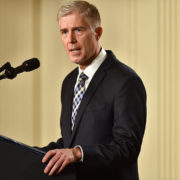A 5-4 U.S. Supreme Court decision reached Monday, May 21 made it so that businesses can now forbid their workers from banding together in class action lawsuits, and instead require individual arbitration.
This comes despite roughly 25 million American workers not having union protections.
Justice Neil Gorsuch, in writing for the conservative majority, said that the decision was determined by the 1925 Federal Arbitration Act which the his supporting justices agreed trumped the National Labor Relations Act (NLRA) — another federal law that opponents stood by.
The NLRA makes it illegal for employers to enforce contracts that deny employees their right to collective action.
Gorsuch argued that if workers were able to band together, “the virtues Congress originally saw in arbitration, its speed and simplicity and inexpensiveness, would be short away and arbitration would wind up looking like the litigation it was mean to displace.
“The policy may be debatable, but the law is clear: Congress has instructed that arbitration agreements like those before us must be enforced as written,” wrote Gorsuch.
“While Congress is of course always free to amend this judgement, we see nothing suggesting it did so in the NLRA — much less that it manifested a clear intention to displace the Arbitration Act. Because we can easily read Congress’s statutes to work in harmony, that is where our duty lies,” he added.
The decision consolidated three cases involving tens of thousands of nonunion employees who claimed they were being underpaid by their employers — Ernst & Young, LLP, Murphy Oil USA Inc., and Epic Systems Corporation. The employers said the arbitration contracts their employees signed prohibited the workers from going forth with any collective proceedings.
Joining Gorsuch in the ruling was Chief Justice John Roberts Jr., and Justices Anthony M. Kennedy, Clarence Thomas, and Samuel Alito Jr.
Writing for the four dissenters was Justice Ruth Bader Ginsburg — the oldest among her justice colleagues. Joining her were Justices Elena Kagan, Sonia Sotomayor, and Stephen Breyer.
The 85-year-old described the majority opinion as being “egregiously wrong” and said it was a step back in U.S. labor rights where “yellow dog” contracts were often used to prevent workers from joining labor unions.
“The end of the 19th century and beginning of the 20th was a tumultuous era in the history of our Nation’s labor relations,” wrote Ginsburg. “Under economic conditions then prevailing, workers often had to accept employment on whatever terms employers dictated.”
“The court today holds enforceable these arm-twisted, take-it-or-leave-it contracts — including the provisions requiring employees to litigate wage and hours claims only one-by-one,” Ginsburg continued. “Federal labor law does not countenance such isolation of employees.”
The justices behind the majority vote argued that using arbitration was less expensive and less time-consuming, but opponents say the decision would be a blow to workers as tens of millions of private nonunion workers will not be able to sue collectively.
Speaking to the Washington Post, president and chief executive of the National Women’s Law Center, Fatima Goss Graves, said that employees may now be forced into an “individual, costly — and often secret — arbitration process.”
“This will stack the deck in favor of the employer,” she said.
To the New York Times, Gregory F. Jacob, a lawyer at O’Melveny & Meyers in Washington D.C., pointed out that arbitration clauses are already being used by employers.
Jacob argued, “It does protect employers’ settled expectations and avoids placing our nation’s job providers under the threat of additional burdensome litigation drain.”
According to Economic Policy Institute, nearly one in four private-sector non-union employees have been made to sign arbitration agreements that include class-action waivers.
Opponents of the Monday ruling further think that the decision will most likely have a detrimental effect on the civil rights class actions regarding discrimination that have been picking up steam like the #MeToo movement, and others regarding race, religion, or gender.
The decision is being considered as the most important business case of the term which began in October and will commence at the end of June. (Rae Ann Varona / AJPress)







